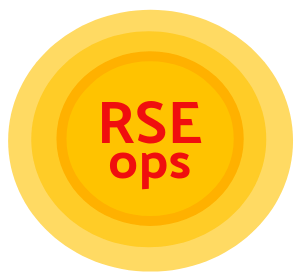
Accessibility for RSE-ops vs. DevOps
When we talk about accessibility in this space, we usually are referring to how a user gets access to software and services. RSE-ops that is focused around HPC usually means providing access to a research cluster, or typically hundreds to thousands of nodes that are connected on a network. These clusters are optimized for command line usage, meaning that users log in via a terminal, and type commands in the prompt to run and monitor jobs, use software, or otherwise interact with the cluster. While some centers have figured out options for interactive notebooks that are accessible via a web interface (e.g., OnDemand from the Ohio Supercomputing Center [1] or JupyterHub [2] for several national labs and academic institutions), typically, opening up resources to a web interface is not a well developed area. Some might argue it’s an issue of not wanting to take risk of "opening up" clusters to a web interface, but realistically it could be called a skill gap. Web technologies were greatly developed and adopted in the more commercial world, and already overworked system admins don’t have the bandwidth to learn this new skill to develop apps and what is required to secure them. As a buffer to this missing service, many centers take a hybrid approach, meaning they make cloud resources (from a vendor like Amazon Web Services (AWS) or Google Cloud or Azure) available separately to groups that have need for these interfaces. This is often called a hybrid cloud [3]. However, as many centers embrace container clusters like Kubernetes and OpenShift, there will soon be this kind of cluster alongside an HPC cluster to run web and storage services asked for by users. The early work to bring interfaces to high performance computing [4] will continue, and following this development will be exciting in the coming years.
DevOps, or providing software and services in the cloud, might have an accessibility advantage over RSE-ops in that the cloud is more likely to be accessible. Theoretically, both HPC clusters and cloud resources can be accessed anywhere with an internet connection, however large HPC centers are more likely to have more stringent access requirements (e.g., logging in with a token as opposed to OAuth2 in a browser), and are less likely to be accessible from the browser or even a mobile phone. As a buffer against this, many app teams go out of their way to provide web of container applications for distribution of their work.
- “OnDemand.” https://www.osc.edu/resources/online_portals/ondemand. [bibtex]
- “Jupyter hub.” https://jupyter.org/hub. [bibtex]
- “What Is Hybrid Cloud? - Benefits and Advantages of a Hybrid Cloud.” https://www.netapp.com/hybrid-cloud/what-is-hybrid-cloud/. [bibtex]
- “Web Portals for High-performance Computing: A Survey.” https://dl.acm.org/doi/pdf/10.1145/3197385. [bibtex]
